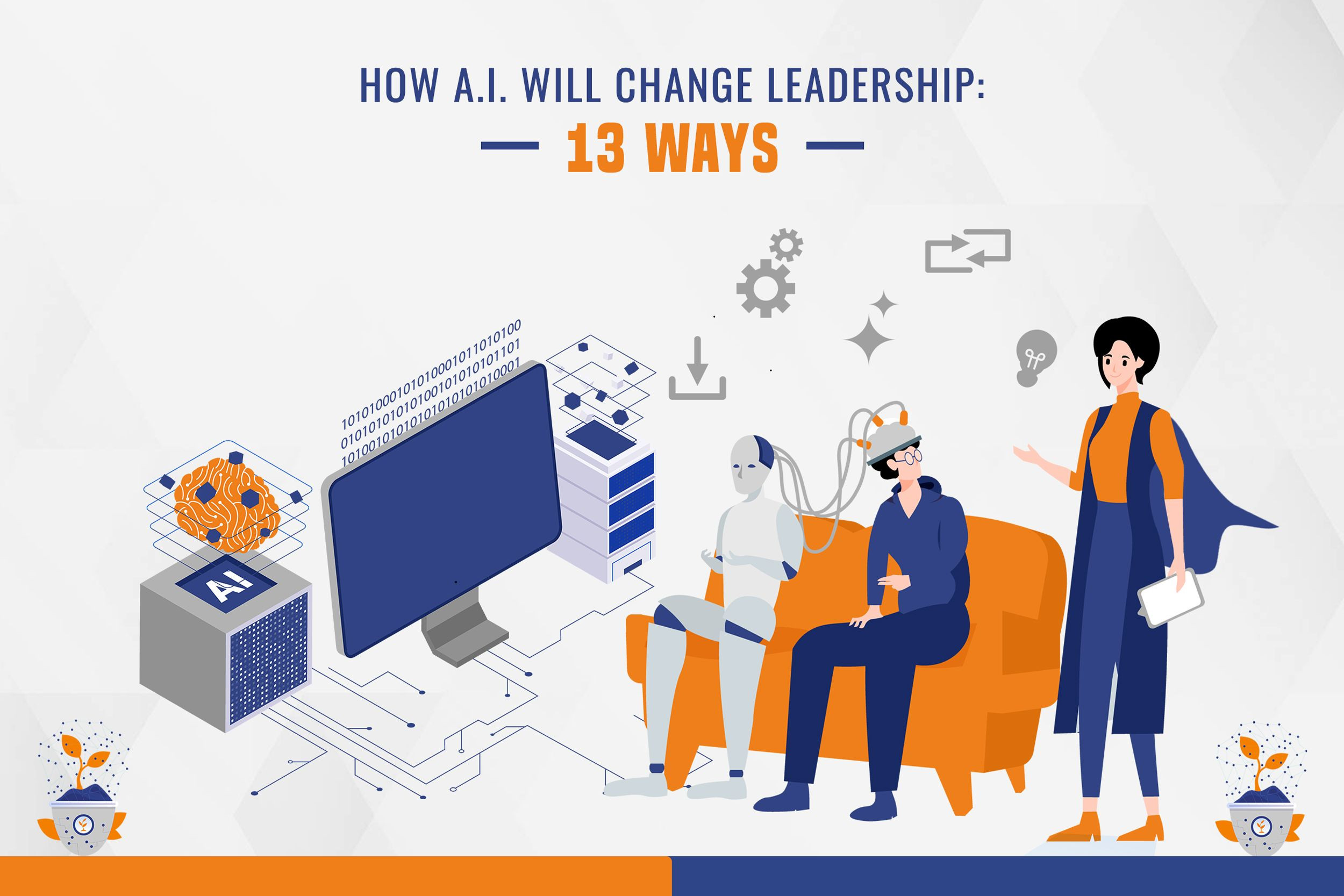
How A.I. Will Change Leadership: 13 Ways
Artificial Intelligence (AI) is transforming industries and reshaping the way we work, live, and lead. In the realm of leadership, AI is ushering in a new era of possibilities and challenges. Leaders who embrace and adapt to these changes are poised to thrive in the age of AI. In this article, we will explore 13 ways in which AI is changing leadership.
The 13 Ways In Which A.I. Will Change Leadership
Data-Driven Decision Making
In today's data-rich environment, AI is a game-changer for leaders. It equips them with an abundance of data-driven insights, transforming the decision-making process. Rather than relying solely on intuition, leaders harness the power of AI-driven analytics to extract valuable information. This enables them to identify emerging trends, anticipate market shifts, and fine-tune operational strategies. With AI as their ally, leaders are better equipped to navigate complexities and make informed decisions that drive success in an increasingly data-driven world.
Personalized Leadership Development
AI is revolutionizing Leadership Training And Development by tailoring programs to individual leaders' unique needs. Through the analysis of strengths and weaknesses, AI systems offer customized training and coaching, enabling leaders to unlock their full potential. This personalized approach fosters growth by addressing specific areas for improvement and capitalizing on existing strengths. With AI as a guide, leaders embark on a journey of continuous improvement, maximizing their effectiveness and making a lasting impact within their organizations.
Enhanced Employee Engagement
AI-driven tools are revolutionizing employee engagement by continuously monitoring and analyzing employee sentiment and engagement levels in real time. This wealth of data empowers leaders to take proactive measures to create a highly engaged and motivated workforce. Chatbots, for example, can offer instant feedback and support to employees, enriching their overall experience. With AI as an ally, leaders can foster a culture of collaboration, well-being, and enthusiasm among their teams, driving productivity and organizational success to new heights.
Predictive Leadership
AI introduces a transformative element to leadership by leveraging predictive analytics. It can forecast Leadership Training and Development success by analyzing an individual's unique blend of characteristics, skills, and experiences. This innovative approach aids organizations in recognizing emerging leaders with the highest potential and helps in devising strategies to nurture and harness their talents effectively. By aligning leadership development with predictive insights, organizations can maximize their leadership bench strength, ensuring future success and sustainability in an ever-evolving business landscape.
Augmented Decision-Making
AI plays a pivotal role in enhancing leadership decision-making. By offering recommendations and presenting various scenarios, AI serves as a valuable decision-support tool. While the ultimate decision-making authority rests with the leader, AI provides critical insights and projects potential outcomes, empowering leaders to make more informed and strategic choices. This collaborative approach between human intuition and AI-driven data analysis ensures that decisions are well-informed and aligned with organizational goals, enabling leaders to navigate complex challenges and seize opportunities with confidence.
Automation of Routine Tasks
AI-driven automation frees leaders from mundane, repetitive tasks and helps them concentrate on more important subjects like Leadership and Management Skills Development. This allows them to focus on strategic thinking, innovation, and building relationships, ultimately making them more effective leaders.
Improved Talent Management
AI-powered systems can identify and recruit top talent more efficiently. These tools can analyze resumes, conduct initial interviews, and assess candidates' compatibility with the organization's culture and goals, reducing the time and resources required for talent acquisition.
Enhanced Customer Insights
Leaders can gain deeper insights into customer behavior and preferences through AI-powered analytics. This information can inform product development, marketing strategies, and customer service initiatives, leading to improved customer satisfaction and loyalty.
Ethical Leadership
AI can assist leaders in making more ethical decisions by identifying potential biases and ethical dilemmas in real time. Ethical AI tools can help leaders navigate complex ethical issues and promote fairness and transparency within their organizations.
Virtual Leadership Assistants
Virtual AI-driven assistants can help leaders manage their schedules, prioritize tasks, and stay organized. These assistants can streamline administrative work, allowing leaders to focus on high-impact activities such as attaining impactful Leadership and Management Training Courses for improving skills.
Enhanced Communication
AI-powered language translation and natural language processing tools can facilitate communication between leaders and global teams. This enables leaders to connect with diverse audiences more effectively and foster collaboration across borders.
Crisis Management
AI can assist leaders in crisis management by providing real-time updates and predictive modeling. During emergencies, AI can help leaders make swift and informed decisions, potentially mitigating the impact of crises on their organizations.
Continuous Learning
AI-driven platforms can provide leaders with access to a vast amount of knowledge and learning resources. Leaders can stay up-to-date with industry trends, leadership best practices, and emerging technologies, fostering continuous learning and growth.
Challenges and Considerations
While AI offers numerous benefits to leadership, it also presents challenges and considerations:
Data Privacy and Security:
AI relies on vast amounts of data, which must be handled securely and ethically to protect individuals' privacy.
Bias and Fairness:
AI algorithms can inherit biases present in the data they are trained on. Leaders must be vigilant in ensuring fairness and avoiding discrimination in AI-driven decisions.
Employee Concerns:
Some employees may be apprehensive about AI's role in leadership and its potential impact on job security. Leaders must address these concerns and communicate the benefits of AI.
Ethical Use:
Leaders must use AI ethically and responsibly, avoiding the temptation to misuse AI for personal gain or unethical purposes.
Final Words
AI is reshaping leadership by providing data-driven insights, personalizing development, enhancing decision-making, and automating routine tasks. It offers new possibilities for talent management, customer insights, ethical leadership, and crisis management. However, leaders must navigate challenges related to data privacy, bias, employee concerns, and ethical use.
Leaders who embrace AI's transformative potential while upholding ethical standards are well-positioned to thrive in the AI-powered future of leadership. By harnessing the power of AI, leaders can make better decisions, engage employees more effectively, and navigate the complexities of our rapidly changing world with confidence.
